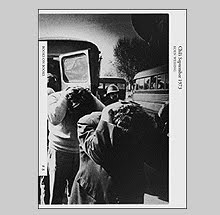Scrapbook by Donovan Wylie

For the past few years Timothy Prus and The Archive of Modern Conflict have been responsible for publishing and co-publishing some of the more interesting photobooks being made. They* had a hand in Stephen Gill's Hackney Wick, Hackney Flowers and A Series of Disappointments. They co-published Henryk Ross' Lodz Ghetto and Larry Towell's The World From My Front Porch with Chris Boot. They produced Nein, Unkel the scrapbook of Nazi snapshots. They published Thijs Groot Wassink's Don't Smile Now. Currently along with Steidl they have co-published Donovan Wylie's newest offering, Scrapbook.
The sectarian violence in Northern Ireland permeated households and extended into personal albums which held family photos sitting alongside clipping from newspapers that kept a gauge of daily life. These scrapbooks often held an odd timeline of the personal and public while encompassing a range of emotional responses to the situation.
The idea of a non-sectarian version of a scrapbook from Northern Ireland, one that pronounces both "aich and haich," is a curious document. In war, the divide between sides can be so great that communication towards resolve is seemingly impossible. For the conflict in Northern Ireland, the single mindedness of Thatcher in clash with the tactics of the many factions of the Irish Republicans split the country where identification with one side or the other not only made everyone a player but was essential. Wylie and Prus's album is meant not to be the view of one but of many. It is a communication between two opposing forces from a fictitious witness. Decorative yokes from the Orange Order sit in close proximity to hand drawn displays of support for the IRA. The reverend Ian Paisley's doughy face pops up several times making him the ever-ready political opportunist while a recipe for a Christmas plum pudding ends with the directions "Serve with Bogside sauce and Petrol Cocktail."
Each viewer of course will flip through this scrapbook with their own politics extending through their fingertips which makes this object perhaps less of a communication than a dual argument wrapped in the same cloth.
Bookwise, Scrapbook is mostly well done although the cover stock feels a bit on the cheap. I realize that part of the idea is the irony of such a serious subject sitting within a dime store scrapbook but I wish that a little better choice had been made for the cover. The interior page stock is well chosen and conveys a strong sense of handmade craft.
On a similar note, the visual artist Steve McQueen's intense first film Hunger gives study to the lives of Irish political prisoners in the notorious HM "Maze" prison. Centered around the various protests for basic prisoner rights - right not to wear a prison uniform, right not to do prison work, right of free association with other prisoners, and to organise educational and recreational pursuits, right to one visit, one letter and one parcel per week, full restoration of remission lost through the protest - it depicts vicious beatings and abuse from prison guards reflective of the stubborn no negotiation policies of Margaret Thatcher that cost the lives of many during hunger strikes.
Prison officials took away the toilets in each cell to which the prisoners responded with a "dirty" protest by refusing to wash, cut their hair, and due to the lack of facilities, smeared feces all over the cell's walls and poured their urine under the doors so it flooded the hallways. Since they refused to wear the clothing of criminals the prisoner's sat naked covered in dirty wool blankets. The discomfort and frustration felt by the guards fed the intense beatings and abuse. In the hands of McQueen, there are few portrayals of hell on earth as visceral as this one.
The film is structured in three acts. The first introduces the characters in the prison through an almost dialogue-less half hour portrayal of the abuse and violence. McQueen's camera is poetic while keeping a claustrophobic tenor within the prison. The second act is an exquisitely acted 22 minute unedited conversation between Bobby Sands and a priest talking over the morality of going on a hunger strike. Taking a page from Bela Tarr or perhaps McQueen's countryman Alan Clarke whose long takes defy traditional filmmaking,** this pivot point of the film left me exhilarated from its endurance and grace. The final act follows the last days of Sands' life as his body transforms with agonizing reality. It is an intense depiction that leaves little room for relief. This film is not for the squeamish.
* Who 'they' are beyond Pruss is something of a mystery as the 'Archive' has no website and little information leading to an actual entity from what I can find.
** Bela Tarr's masterpiece Satantango has by my estimate only around 150 cuts/edits to the film over its 7.5 hour running time. Alan Clarke's Elephant used long-take steadycam shots to depict sectarian murders.











